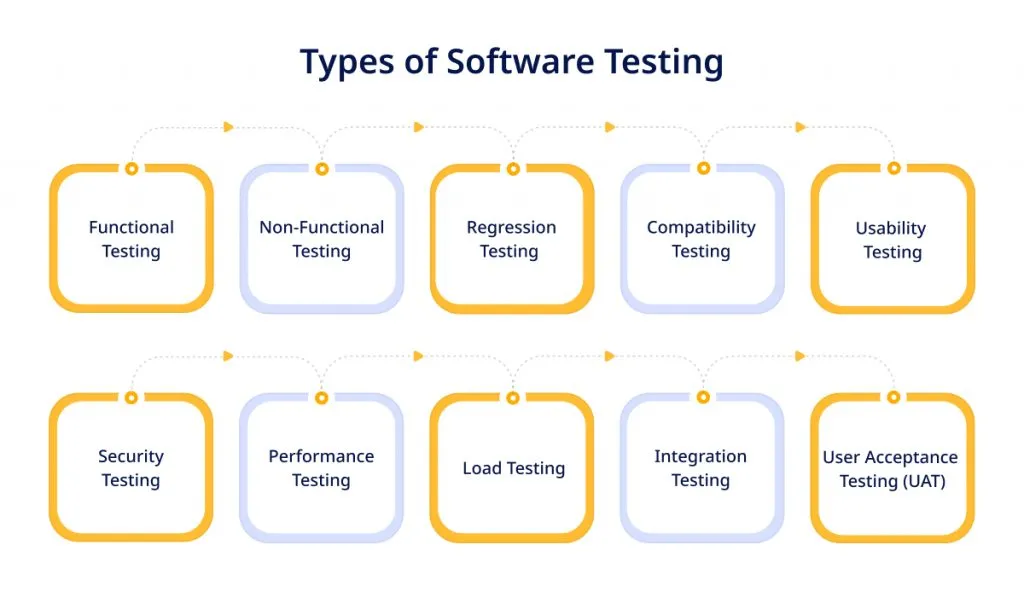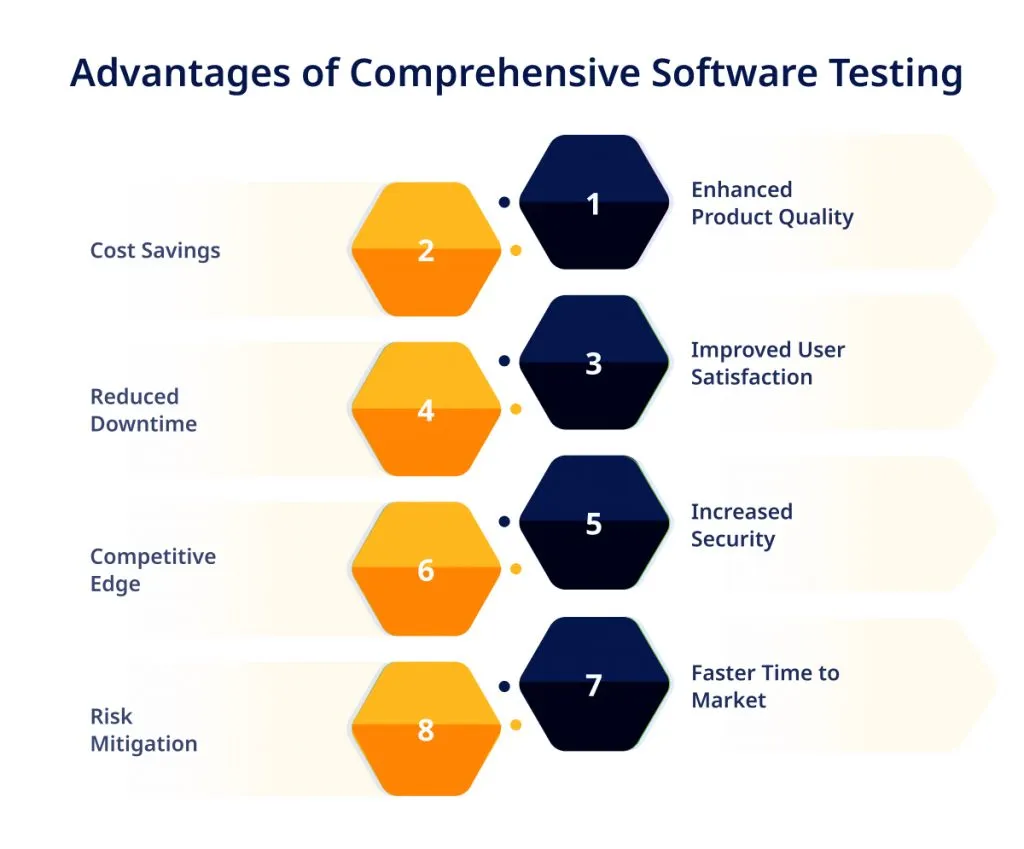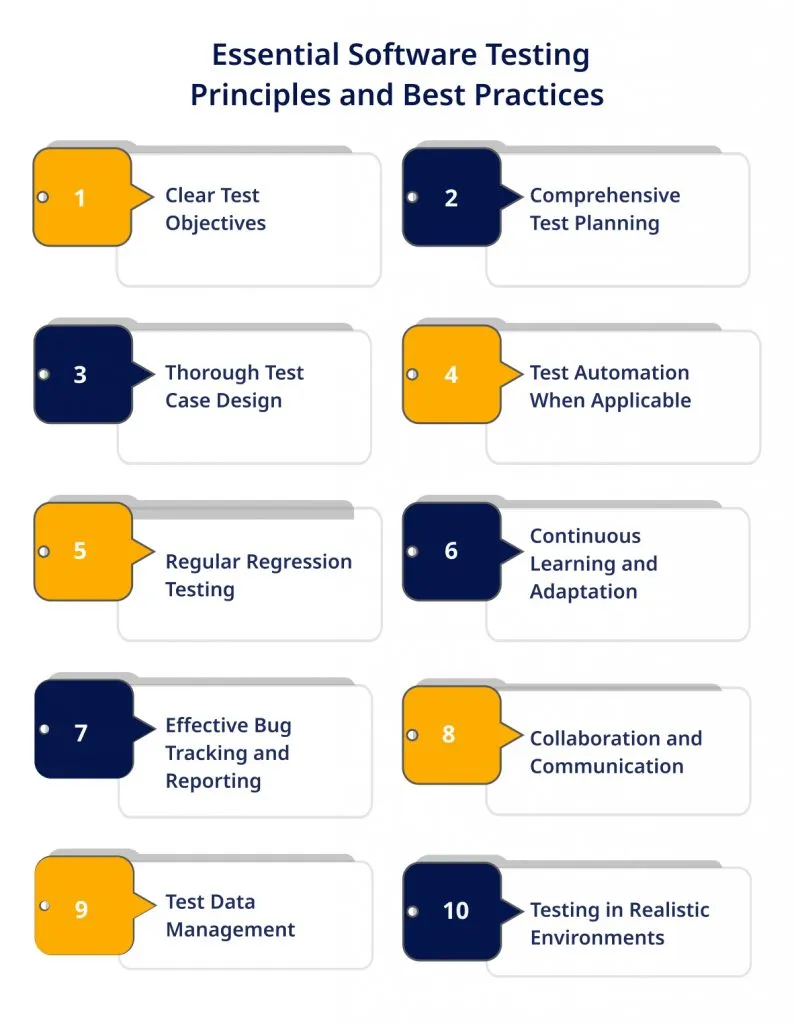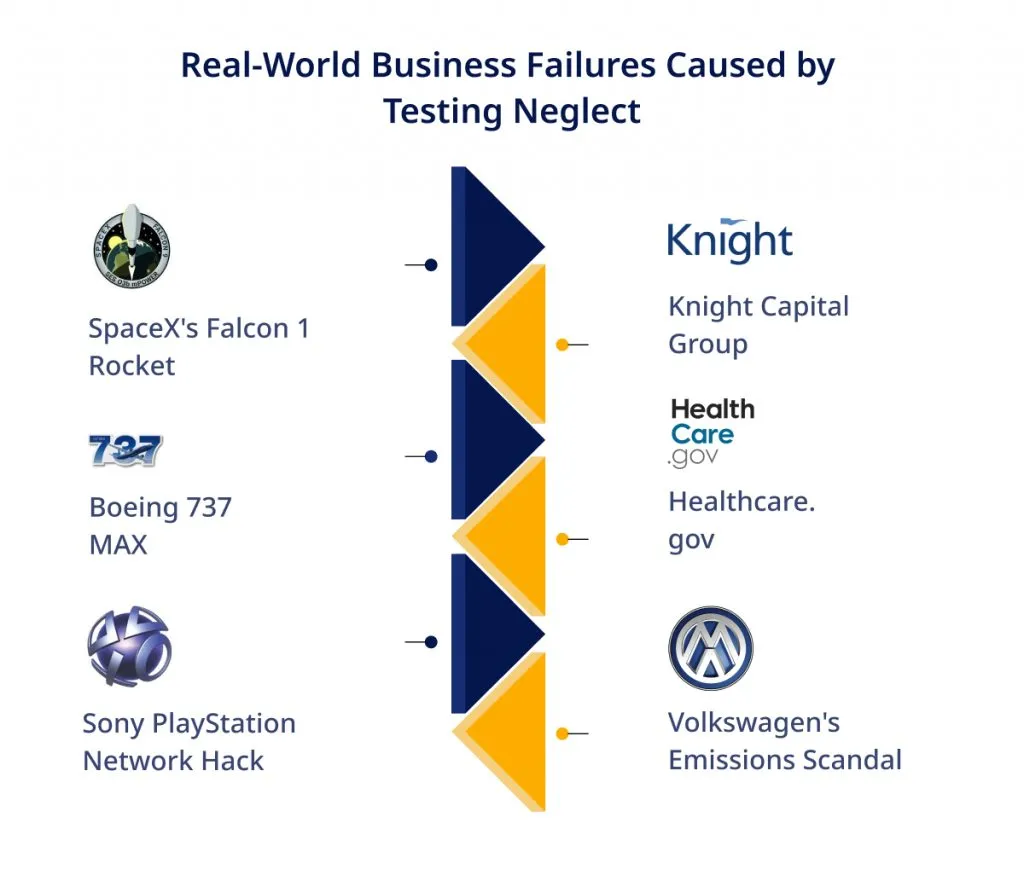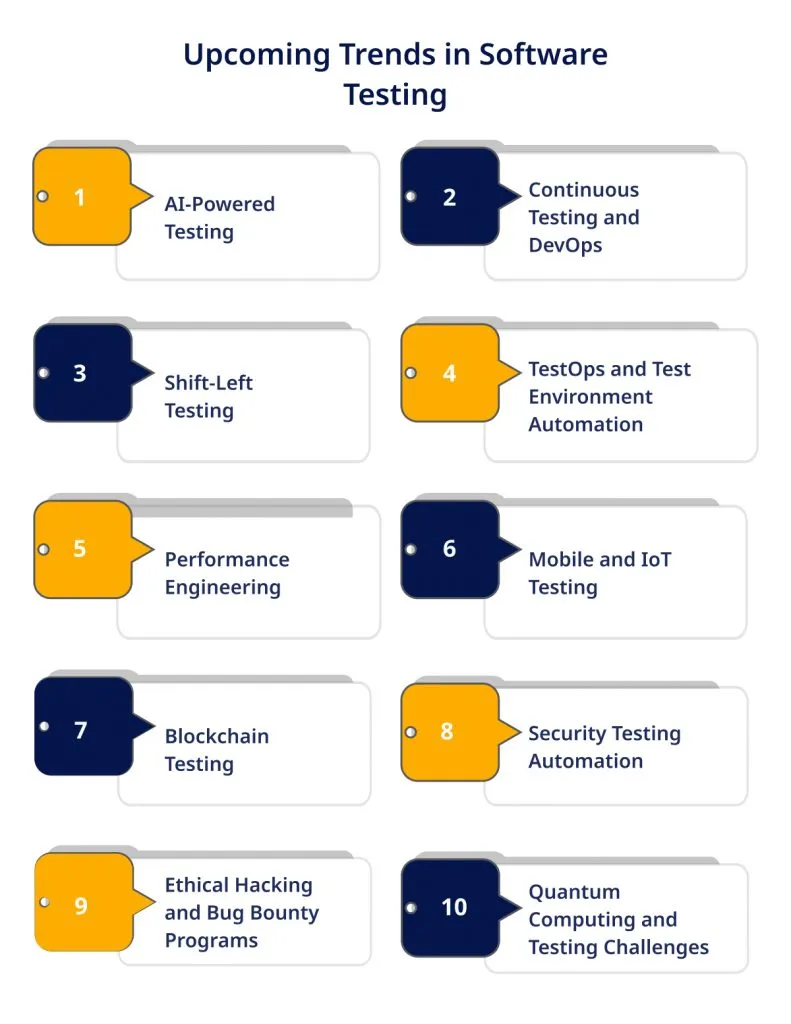Is your business releasing bug-ridden, crash-prone software?
According to recent surveys, 92% of users report abandoning apps and websites due to poor performance and errors.
Software quality can make or break your company’s reputation and bottom line in today’s competitive digital landscape. That’s why robust software testing is no longer optional – it’s an absolute must for any successful business.
In this weblog, we’ll explore the multitude of benefits a strong testing strategy can bring to your organization.
You’ll learn how proper QA and testing allow you to delight customers, drive revenue, and gain a competitive edge with high-quality software.
We’ll discuss how the right software testing services can surface critical defects before they reach your end users. You’ll also discover how prioritizing testing leads to faster development cycles and more resilient code.
Building software without adequate QA is risky business whether you’re a startup or an enterprise.
Ready to learn how proper testing can help you deliver innovative software users love while avoiding detrimental bugs?
Read on to unlock the business benefits and role of Quality Assurance in Business and how Web Application Testing Services can be a savior!
Key Takeaways:
- Customer Retention Matters: With 92% of users abandoning platforms due to performance issues, focusingte on software quality is crucial for retaining your customer base.
- Competitive Edge: In a digital landscape, a strong testing strategy is a differentiator that can set your business apart from competitors, ensuring a positive user experience.
- Revenue Impact: Software glitches can directly impact your bottom line. Prioritizing testing is an investment that pays off by avoiding revenue loss caused by dissatisfied users.
Learn how ValueCoders' software testing services can fortify your brand's reputation with testing.
The Role of Software in Today’s Business Landscape
Software is crucial for businesses today to operate efficiently and provide value to customers. High-quality software enables companies to innovate, automate processes, and scale operations.
Testing and quality assurance of software is crucial for businesses to avoid disruptions from bugs and ensure systems function as intended. Thorough testing identifies defects early so they can be fixed before deployment. This saves time and money compared to fixing issues after launch.
Key software testing benefits for business include:
- Improved customer satisfaction: Rigorously tested software, especially user-facing apps, produces higher-quality customer experiences. This builds trust and loyalty.
- Reduced risk: Testing minimizes the chances of critical failures that could harm a company’s reputation or finances.
- Faster time to market: Test automation and parallel testing enable faster delivery of software features and products. This allows businesses to remain responsive and capitalize on opportunities.
With software now deeply embedded in operations, dedicating resources to testing and QA is a wise investment that pays dividends through more robust systems, faster delivery, and avoiding disruptive defects.
It not only ensures that your software meets high-quality standards but also plays a crucial role in shaping a positive user experience, fostering operational efficiency, and ultimately contributing to the success of your business in today’s competitive landscape.
Also read: How AI is Changing Software Testing Forever?
Types of Software Testing
Software testing is crucial to the development process to deliver high-quality applications. To understand the importance of testing, you must be aware of its diverse types and focus on various aspects of an application.
Some key types include:
- Unit testing – verifies individual modules or components function as intended. Catches issues early.
- Integration testing – checks interactions between integrated components or systems. Ensures proper data flow.
- System testing – validates the entire system meets requirements. Tests end-to-end workflow.
- Performance testing – assesses speed, scalability, and reliability under expected load. Uncovers bottlenecks.
- Usability testing – evaluates ease of use from an end-user perspective. Identifies navigation or workflow issues.
- Security testing – uncovers vulnerabilities that could lead to exploits or data breaches. Critical for secure software.
Comprehensive test coverage across these different types is important for delivering high-quality software that meets business and user needs. Thorough testing has significant benefits:
- Reduces software defects and quality issues experienced by end users. This improves customer satisfaction.
- It captures problems early in development, which is faster and cheaper.
- Provides confidence in the software before launch or deployment. Minimizes business disruption risks.
- Verifies software meets requirements and intended functionality. Ensures ROI on development.
- Future proofs functionality and performance as the application evolves.
With today’s complex software powering key business functions, comprehensive testing coverage provides the quality and confidence needed for successful software deployments.
It is an investment that pays dividends across the software lifecycle. Thus, make the right choice while partnering with Software QA & Testing Services to make sure your efforts count!
ValueCoders' software testing practices shield your brand's reputation from potential disasters.
The Business Impact of Inadequate Testing
Inadequate software testing can significantly hurt a business. Without thorough validation, defects inevitably make it into production. The consequences of this include:
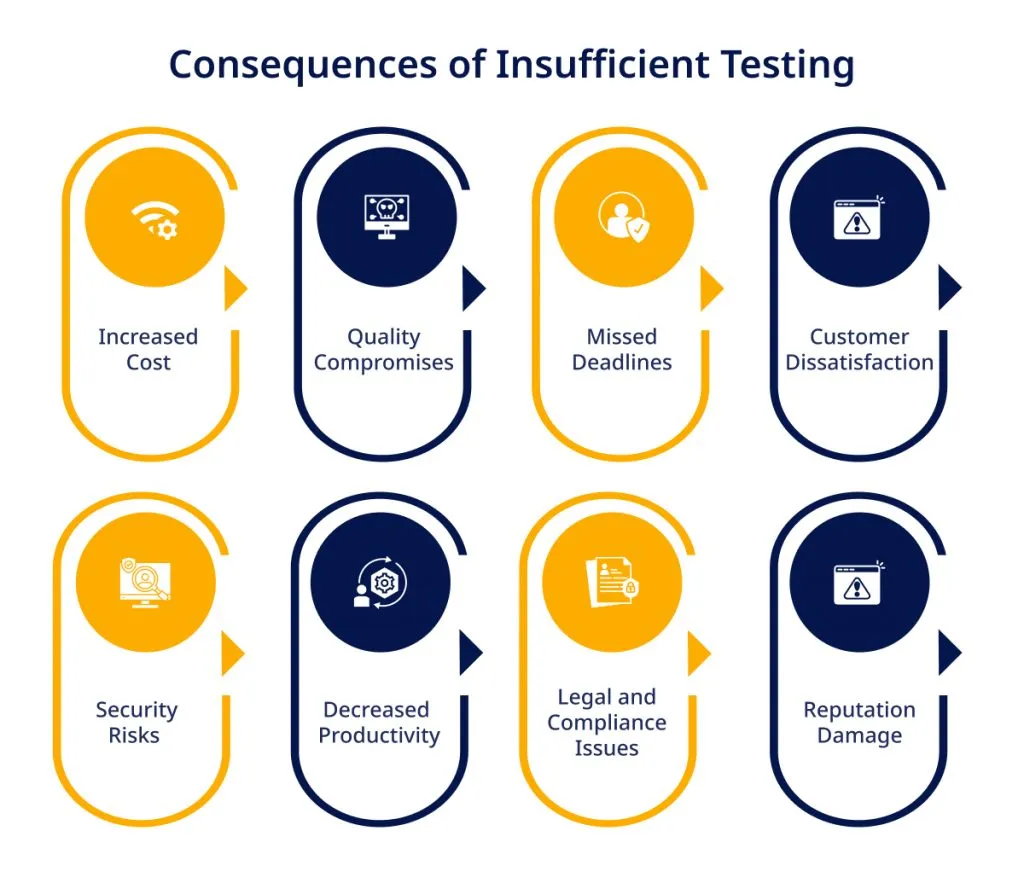
2. Revenue and productivity losses: System failures or performance issues directly disrupt business operations and processes. Employees waste time working around problems versus being productive.
3. Increased costs: Significant resources must be spent on identifying the root causes of issues and deploying fixes after the fact. It is exponentially more expensive than building quality from the start.
4. Security vulnerabilities: Lack of security testing leaves apps and data vulnerable to exploits, breaches, and attacks. The financial and reputational damage can be severe.
5. Missed market opportunities: Inadequate performance testing can slow time-to-market. Competitors can capitalize on opportunities first while fixing unexpected scalability bottlenecks.
6. Unmet compliance obligations: Many regulations require proof of quality processes and secure software. Inadequate testing causes compliance failures.
The costs and risks amplify over time as the software grows. The negative business impacts accumulate across the organization.
Instilling quality early through comprehensive test coverage is the key to avoiding these pitfalls. Test automation also provides efficiency gains over time.
Hiring dedicated QA testers and outsourced testing services for mission-critical software can provide the expertise and capacity needed for proper validation.
Upfront investment in testing pays for itself many times over by reducing business disruption, costs, and risks down the road. It enables companies to deliver better software faster to fuel business growth
ValueCoders' software testing practices shield your brand's reputation from potential disasters.
Benefits of Robust Software Testing
Thorough, comprehensive software testing delivers immense value for businesses and should be a priority. The key benefits include:
- Higher quality software: Rigorous testing identifies defects and validation issues early when they are cheaper to fix. This results in more stable software with fewer disruptive bugs.
- Reduced business risks: Testing minimizes the chances of failures or performance problems after launch. This protects company finances, reputation, and operations.
- Improved user experience: Verifying software works as intended from an end-user perspective results in more intuitive, responsive applications that drive adoption.
- Faster delivery of features: Test automation and effective test management accelerate validation. This enables faster releases to keep pace with market demands.
- Lower long-term costs: Investing in testing early reduces exponentially more expensive rework. Finding issues late can jeopardize entire projects.
- Confidence in software updates: Existing functionality remains intact when changes or upgrades are thoroughly tested. No unwanted surprises from deployments.
- Compliance: Rigorous testing provides audit proof of secure, quality software as regulations require. Avoid fines and penalties.
- Competitive advantage: High-performance, reliable software that delights customers creates positive brand recognition and loyalty.
To reap these benefits, businesses should leverage test automation, AI-based testing, and outsourced testing services.
These provide expertise, efficiency gains, and capacity to enable comprehensive testing coverage, including integration testing. In today’s software-driven business landscape, robust testing is a strategic investment—not an overhead cost. It translates directly into bottom-line results.
Businesses can also consider the advantages of outsourcing software testing if their team doesn’t have the bandwidth to perform all the tasks.
Find out how ValueCoders' software testing can help you achieve a higher return on investment.
Key Principles and Best Practices in Software Testing
Whether it’s Automated Testing Services or Manual, here are several guiding principles and best practices to enable effective software testing. These key points will help you mitigate business risks with testing:
- Begin testing early: Start test planning and strategy when requirements are defined, not after the code is complete. This enables test-driven development.
- Prioritize risks: Focus testing on high-risk areas and critical business functions. Thoroughly test security, financials, compliance, etc.
- Validate edge cases: Stress test boundary conditions and account for unexpected user behavior outside happy paths.
- Automate when possible: Automated testing provides efficiency, consistency, and coverage that is difficult to achieve manually.
- Continuously integrate and test: Merge code frequently and validate to catch issues early before they compound.
- Test as realistically as possible: Use real customer data, deployments, and usage patterns during testing.
- Define and track metrics: Quantifiable coverage, defect, and performance metrics reveal testing gaps.
- Involve users in UAT: User acceptance testing ensures software works as intended for real-world users.
- Retest after changes: Confirm existing functionality remains intact after any updates or new releases.
- Create reusable test assets: Leverage libraries of automated tests across sprints, releases, and app versions.
- Focus on prevention over bug fixes: Rigorous processes, best practices, and training prevent defects from entering code.
Business benefits of software testing can lead to enhanced project performance. Adopting these Software Testing Best Practices requires upfront investment but pays long-term dividends.
They instill quality earlier, enable continuous delivery pipelines, and prevent costly disruptions.
For many companies, outsourced testing and QA services can provide the expertise and capacity needed to implement these principles at scale. This is especially true for smaller organizations or those without in-house resources.
Learn how ValueCoders ensures error-free software, strengthening your brand's trustworthiness.
Case Studies
To better understand the importance of Testing and Software Quality, let’s look at some of the popular case studies. Many companies have experienced adverse effects of ignoring the importance of software testing and quality assurance:
SpaceX Falcon Rocket
In 2015, a SpaceX rocket exploded during a supply mission to the International Space Station, resulting in a total loss. The root cause was traced to a software configuration issue in the strut assemblies. Thorough testing and validation of the software could have prevented this failure.
Boeing 737 MAX
Software problems with the automated MCAS flight control system led to two deadly crashes in 2018 and 2019. Insufficient testing failed to uncover how the system could override pilots and cause catastrophic malfunctions. This resulted in hundreds of lives lost and the entire fleet being grounded.
Sony PlayStation Network Hack
In 2011, Sony’s gaming network was breached, exposing the personal data of 77 million users. The culprit was SQL injection, a common software vulnerability that thorough testing and security validation could have prevented. This resulted in huge financial losses and reputation damage for Sony.
Knight Capital Group
A software deployment error at this financial firm triggered a trading algorithm to lose $440 million in just 45 minutes. Rigorous testing before deploying the new software could have caught the defect and saved the company from bankruptcy.
Volkswagen Emissions Scandal
VW programmed engine software to cheat on emissions tests, resulting in $30 billion in damages and fines when revealed. Comprehensive validation testing would have uncovered the deception during development.
These are great examples of the importance of software testing. They showcase how deliberate testing strategies and investments, whether improving stability, catching regressions, uncovering UX issues, or enabling faster release velocity, directly translate into positive business results.
Companies reaping the greatest rewards have embraced software application testing services as a collaborative process across teams and project lifecycles – not a downstream checklist. This instills quality by design versus chasing defects after the fact.
Explore how ValueCoders' testing strategies can give your brand a competitive edge in the market.
Challenges in Implementing Effective Software Testing
While critical, implementing comprehensive, high-quality software performance testing presents some common challenges:
- Resource constraints: Testing is often perceived as unglamorous grunt work and deprioritized. Insufficient time, budget, and headcount make robust testing difficult.
- Lack of expertise: Testing complex systems requires specific skill sets. Not having qualified staff leads to inadequate test coverage.
- Manual processes: Relying solely on manual testing makes achieving thorough test coverage impractical at scale.
- Testing too late – Beginning testing after the code is complete leaves little time for fixes. Issues pile up at the end.
- Unclear requirements: When requirements are ambiguous or constantly changing, validating intended functionality becomes difficult.
- Communication silos: Collaboration gaps between test and dedicated development teams result in late-breaking issues.
- Focus on happy paths: Edge cases and failure modes often get overlooked when testing follows happy paths.
- Infrastructure limitations: Inadequate test environments and data make replicating real-world conditions difficult.
- Metrics and analytics: Lack of measurable QA goals and progress visibility makes meaningful improvements unlikely.
While challenging, these roadblocks can be overcome by prioritizing testing across the organization, investing in continuous improvement of processes, embracing test automation, fostering cross-team collaboration, and leveraging outside expertise where needed.
Many companies outsource software testing and QA services to help supplement in-house resources and capabilities. Leveraging external perspectives and dedicated testing teams prevents testing from falling through the cracks.
With software now critical to operations, overcoming testing limitations separates high-performing organizations from those plagued by quality issues.
Also read: Enhancing QA Efficiency Through Automation
The Evolving Landscape of Software Testing
Software testing is evolving rapidly as development practices and technologies change. Following are some key trends shaping the landscape and increasing software testing importance:
1. Shift left testing: Testing moves earlier into development cycles through techniques like test-driven development. Issues are caught sooner.
2. Intelligent test automation: AI and ML enhance test automation with self-healing scripts and automated test generation capabilities. The prospect of AI in Software Testing is bright as businesses have already started leveraging this technology.
3. Testing in production: Testing directly in production environments provides realism that is difficult to replicate otherwise. This uncovers real-world issues.
4. Security testing prioritization: Robust security testing is crucial for app protection. Considering the number of apps increasingly targeted by hackers, businesses must hire Software QA Testers for their teams.
5. Customer-centric testing: Customer experience metrics and usability testing now guide development, not just meeting requirements. This helps in enhancing Customer Satisfaction through testing and a better response.
6. Agile and DevOps transformation: Faster iteration cycles require more automated testing and continuous delivery techniques.
7. Platform and end-point proliferation: Apps now run on diverse platforms from wearables to connected devices. Cross-platform testing is key.
8. Skills shortages: As testing complexity increases, talent gaps emerge in areas like test automation. Retention is challenged.
These trends underscore how software testing is becoming even more strategic and integral to development. Adapting testing strategies for the realities of rapid releases, smarter applications, and customer-driven development is now mandatory to remain competitive.
Companies embracing modern testing techniques and localization in Mobile App Testing are best positioned to thrive amidst the ongoing evolution.
Discover how ValueCoders' software testing services unlock new growth opportunities.
Final Words
As the previous sections have explored, comprehensive software testing delivers immense value and should be a strategic priority.
Software underpins key operations and enables competitive advantage in today’s digital business environment. Without rigorous validation, defects erode customer trust, disrupt operations, increase costs, and hinder agility.
Testing identifies issues early when they are cheaper to fix. This prevents failures down the road that carry severe penalties. Effective testing also confirms software works as intended for users. Neglecting this risks dissatisfaction and adoption barriers.
To maximize software investments, savvy companies like ValueCoders now adopt modern techniques like intelligent test automation, customer-centric testing, and outsourced QA services. These provide the expertise and capacity necessary for continuous testing across rapid releases.
Inadequate testing compromises brand reputation, finances, and compliance. The companies thriving amidst intensifying digital disruption view testing as an opportunity, not an obligation.
They recognize how upfront investments in validation and quality yield manifold returns over software lifetimes. For any business relying on technology to execute its strategy, prioritizing software testing separates market leaders from those weakened by instability.


